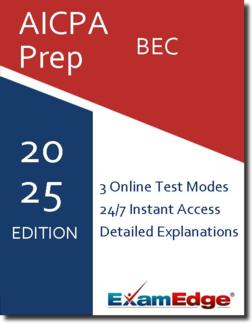AICPA BEC (BEC) Practice Tests & Test Prep by Exam Edge - Topics
Based on 20 Reviews
- Real Exam Simulation: Timed questions and matching content build comfort for your AICPA BEC test day.
- Instant, 24/7 Access: Web-based AICPA Business Environment and Concepts practice exams with no software needed.
- Clear Explanations: Step-by-step answers and explanations for your AICPA exam to strengthen understanding.
- Boosted Confidence: Reduces anxiety and improves test-taking skills to ace your AICPA Business Environment and Concepts (BEC).

Understanding the exact breakdown of the AICPA Business Environment and Concepts test will help you know what to expect and how to most effectively prepare. The AICPA Business Environment and Concepts has multiple-choice questions The exam will be broken down into the sections below:
| AICPA Business Environment and Concepts Exam Blueprint | ||
|---|---|---|
| Domain Name | % | Number of Questions |
| Corporate Governance | 17-27% | 23 |
| Economic Concepts and Analysis | 17-27% | 23 |
| Financial Management | 11-21% | 15 |
| Information Technology | 15-25% | 20 |
| Operations Management | 15-25% | 20 |


